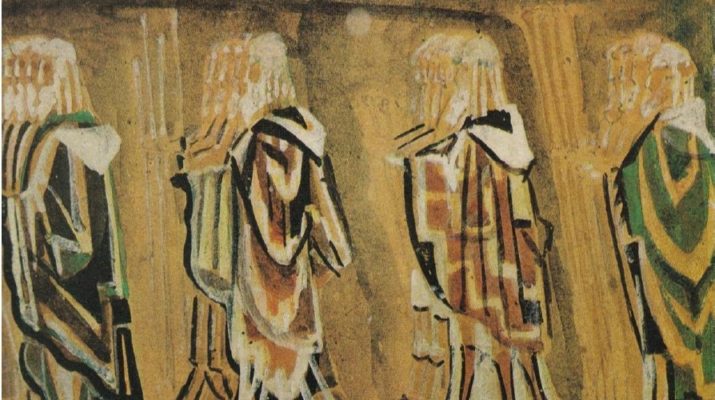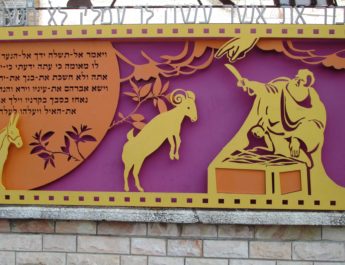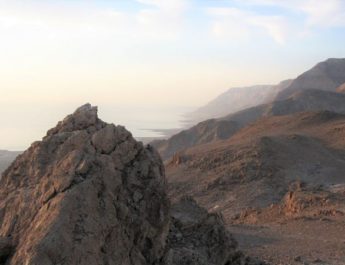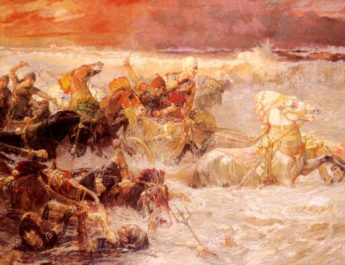Leviticus 1
BibleHub
1 The LordA summonedB MosesC and spokeD to him from the tentE of meeting,F saying,
Notes on verse 1
A “Lord” = YHVH. From havah (to be, become) or hayah (to come to pass, become, be). This is the name of the God of Israel, the self-existent and eternal one, the tetragrammaton. This pronunciation has been lost to time so “Lord” is generally used in its place.
B “summoned” = qara. This is to call or call out – to call someone by name. Also used more broadly for calling forth.
C “Moses” = Mosheh. From mashah (to pull out in a literal or figurative sense, to draw out) OR from Egyptian mes or mesu (child, son i.e. child of…). This is Moses – the one drawn out from the water, which is to say, rescued. If derived from the Egyptian, his name would share a root with Rameses and Thutmose.
D “spoke” = dabar. This is generally to speak, answer, declare, or command. It might mean to arrange and so to speak in a figurative sense as arranging words.
E “tent” = ohel. Perhaps from ahal (to shine, be clear). This is a tent, covering, home, or side pillar.
F “meeting” = moed. From yaad (to appoint, assemble or gather selves, agree). This is a meeting, assembly, fixed time. It can be used for a festival or feast. It can also refer to a meeting place.
2 “Speak to the IsraelitesG and say to them: When anyH of you bringI
Notes on verse 2a
G “Israelites” = ben + Yisrael. Literally, “children of Israel.” Ben is from banah (to build or obtain children). This is son, age, child. It is son in a literal or figurative sense. Yisrael is from sarah (to persist, exert oneself, contend, persevere, wrestle, prevail) + el (God or god). This is Israel, meaning God strives or one who strives with God; new name for Jacob and for his offspring. This refers to the people and to the land.
H “any” = adam. Perhaps from adam (to be red, make ruddy); related to adamah (ground, dirt, earth). This is man, humankind, also Adam’s name. It refers to a human individual or humanity.
I “bring” = qarab. This is to come near, offer, make ready, approach, take.
an offeringJ of livestockK to the Lord, you shall bring your offering from the herdL or from the flock.M
Notes on verse 2b
J “offering” = qorban. Related to “bring” in v2. From qarab (see note I above). This is an offering or oblation, which is to say, a sacrifice.
K “livestock” = behemah. This is animal or cattle. It is often used of large quadrupeds.
L “herd” = baqar. From baqar (to plow, break forth; figuratively, to inquire, inspect, consider). This is cattle – an animal used for plowing.
M “flock” = tson. This is a flock of sheep and goats.
3 “If the offering is a burnt offeringN from the herd, you shall offerO a maleP without blemish;Q
Notes on verse 3a
N “burnt offering” = olah. From alah (to go up, climb, approach, bring; to be high or actively climb; can be literal or figurative). This is a step, stairs, or some kind of ascent. It is also used for whole burnt offerings, being the offering in which the whole things is burned and rises as smoke. Burnt offerings were the least common of the offerings: most were eaten, shared with the priest and the one bringing the offering.
O “offer” = qarab. Same as “bring” in v2. See note I above.
P “male” = zakar. From zakar (to remember, to mark something so that it can be recalled, to be mindful of, to mention). This is male. Properly, perhaps, it means one who is remembered, which is to say a male.
Q “without blemish” = tamim. From tamam (to finish or accomplish; to make perfect, demonstrate that you are upright; consume; to complete in a literal or figurative sense). This is entire in a literal or figurative sense. So, it could be complete, full, intact, or without defect. Alternately, it could refer to being sound, having integrity, being sincere or perfect.
you shall bring it to the entranceR of the tent of meeting, for acceptanceS on your behalf beforeT the Lord.
Notes on verse 3b
R “entrance” = petach. From patach (to open wide in a literal or figurative sense, loosen, plow, carve). This is opening, door, gate, entrance.
S “acceptance” = ratson. From ratsah (to be pleased with, delight, take pleasure in, or accept with favor; to approve or consent regarding something; can be used specifically of satisfying debts or being pardoned). This is delight shown in favor, good will, something that is accepted or acceptable.
T “before” = paneh. From panah (to turn, face, appear). This is face in a literal or figurative sense. It could be face, presence, anger, respect. It can also be used of God to indicate divine favor or presence.
4 You shall layU your handV on the headW of the burnt offering, and it shall be acceptableX on your behalf as atonementY for you.
Notes on verse 4
U “lay” = samak. This is to lean, rest, support, brace, uphold, sustain, or establish. It is to lean on in a positive or negative sense.
V “hand” = yad. This is hand, ability, power. Hand in a literal sense, but also what one can do or the means by which one does it.
W “head” = rosh. This may come a word that means to shake. It is the head, captain, or chief. It can also be excellent or the forefront. It can be first in position or in statue or in time (i.e. the beginning).
X “be acceptable” = ratsah. Related to “acceptance” in v3. See note S above.
Y “atonement” = kaphar. This is to appease, cover, pacify, cancel, make atonement, placate. Specifically, it can mean to cover with bitumen.
5 TheZ bull shall be slaughteredAA before the Lord, and Aaron’sBB sonsCC the priestsDD
Notes on verse 5a
Z {untranslated} = ben. Same as “Israelites” in v2. See note G above.
AA “be slaughtered” = shachat. This is to slaughter, slay, or beat. It can be slaying for a sacrifice or in a massacre.
BB “Aaron’s” = Aharon. Derivation uncertain. May mean “bearer of martyrs” OR be related to Ancient Egyptian ꜥḥꜣ rw (warrior lion) OR elevated, exalted, high mountain. This is Aaron. See https://en.wiktionary.org/wiki/Aaron
CC “sons” = ben. Same as “Israelites” in v2. See note G above.
DD “priests” = kohen. This is literally the one who officiates i.e. the priest. This is where the Jewish last name “Cohen” (and its variants) comes from.
shall offer the blood,EE dashingFF the blood against all sidesGG of the altarHH that is at the entrance of the tent of meeting.
Notes on verse 5b
EE “blood” = dam. Perhaps from damam (to cease, be or become mute, silent, still, cut off, hold peace, be astonished, die). This is blood, bloodshed, bloodguilt, lifeblood, and death. It is used for people and animals. More often blood from a wound or the blood of the innocent. Used figuratively for violence or for wine. Closely tied to life and death.
FF “dashing” = zaraq. This is to scatter or sprinkle, whether a liquid or a solid.
GG “all sides” = sabib. From sabab (turning around, going around; to surround, cast, walk, fetch; to revolve or border in a literal or figurative sense). This is a circuit or a circle. It could refer to an environment, one’s neighbors, or a circular path round about.
HH “altar” = mizbeach. From zabach (to kill, slay, offer; slaughtering an animal to offer as a sacrifice). This is an altar.
6 The burnt offering shall be flayedII and cut upJJ into its parts.KK 7 The sons of the priest Aaron shall putLL fireMM on the altar and arrangeNN woodOO on the fire.
Notes on verses 6-7
II “be flayed” = pashat. This is to raid or invade. Figuratively, it means to strip or plunder
JJ “cut up” = nathach. 9x in OT. This is to dismember or divide at the joints.
KK “parts” = nethach. Related to “cut up” in v6. 13x in OT. From nathach (see note JJ above). This is a piece or portion.
LL “put” = natan. This is to give, put, set, offer. It is to give literally or figuratively.
MM “fire” = esh. This is fire, burning, flaming, hot. It is fire in a literal or figurative sense.
NN “arrange” = arak. This is to arrange by setting in a row. It can also mean to set a battle, estimate, put in order, or compare.
OO “wood” = ets. Perhaps from atsah (to shut, fasten, firm up, to close one’s eyes). This is tree or other things related to trees like wood, sticks, or stalks. It can also refer to wood products like a plank or staff or gallows. Additionally, this can refer to a carpenter.
8 Aaron’s sons the priests shall arrange the parts, with the head and the suet,PP on the wood that is on the fire on the altar, 9 but its entrailsQQ and its legsRR shall be washedSS with water.TT
Notes on verses 8-9a
PP “suet” = peder. 3x in OT – all from Leviticus. May come from a word that means to be greasy. This is suet or fat.
QQ “entrails” = qereb. Related to “bring” and “offering” in v2. Perhaps from qarab (see note I above). This is among, in the midst, before, the center It is the inward part, whether literal or figurative. It can also be used for the heart, the site of thoughts and feelings. This word is also used as a technical term for the entrails of the animals who are sacrificed.
RR “legs” = kera. 9x in OT. From kara (to bow, crouch, kneel down, subdue; to bend the knee in many senses). This is the leg, but only from the knee down to the ankle. It is used in the OT of people and of locusts.
SS “washed” = rachats. This is to wash, wash away – it can be complete or partial.
TT “water” = mayim. This is water, waters, or waterway in a general sense. Figuratively, it can also mean juice, urine, or semen.
Then the priest shall turn the restUU into smokeVV on the altar as a burnt offering, an offering by fireWW of pleasingXX odorYY to the Lord.
Notes on verse 9b
UU “rest” = kol. From kalal (to complete). This is all or every.
VV “turn…into smoke” = qatar. Perhaps from qetoreth (smoke, incense, the scent of the sacrifice as it burned); from the same as qitor (thick smoke, vapor). This is to make an offering, particular one of burned incense. It focuses on the fragrance made from the sacrificial fire. This is generally used to refer to worship.
WW “offering by fire” = ishsheh. Related to “fire” in v7. From eshshah (a fire); from esh (see note MM above). This is an offering by fire or a burnt offering. More broadly, it can refer to any kind of sacrifice.
XX “pleasing” = nichoach. From nuach (to rest, calm, camp, free, place, remain, satisfy, settle, station, or wait; implies settling down in a literal or figurative sense). This is soothing, restful, sweet, pleasant.
YY “odor” = reyach. From ruach (to blow, breath; smell, anticipate; figuratively, to perceive, understand). This is a scent or breath – a savor, ointment. It is also used for the odor of sacrifices that pleases God.
10 “If your giftZZ for a burnt offering is from the flock, from the sheepAAA or goats,BBB your offering shall beCCC a male without blemish.
Notes on verse 10
ZZ “gift” = qorban. Same as “offering” in v2. See note J above.
AAA “sheep” = keseb. 13x in OT. From kebes (root may mean to dominate; a young male sheep at the age of butting other sheep). This is apparently the same word as kebes, but with the consonants mixed up. It is a young lamb or sheep.
BBB “goats” = ez. Perhaps from azaz (to be strong in a literal or figurative sense, overcome, be impudent). This is a female goat, but can refer to male goats when plural.
CCC “offering shall be” = qarab. Same as “bring” in v2. See note I above.
11 It shall be slaughtered on the northDDD sideEEE of the altar before the Lord,FFF and Aaron’s sons the priests shall dash its blood against all sides of the altar. 12 It shall be cut up into its parts, with its head and its suet, and the priest shall arrange them on the wood that is on the fire on the altar, 13 but the entrails and the legs shall be washed with water. Then the priest shall offer the rest and turn it into smoke on the altar; it is a burnt offering, an offering by fire of pleasing odor to the Lord.GGG
Notes on verses 11-13
DDD “north” = tsaphon. From tsaphan (to hide, hoard, reserve; to cover over or figuratively to deny; also to lurk). This is properly hidden, dark, or gloomy. It can also be used to refer to the north.
EEE “side” = yarek. Root may mean to be soft. This is thigh, side, body, shank. It can be used figuratively for genitalia.
FFF “Lord” = YHVH. Related to “Lord” in v1. See note A above. It has a different vowel pointing, but the same meaning as “Lord” above.
GGG “Lord” = YHVH. Same as “Lord” in v1. See note A above.
14 “If your offering to the Lord is a burnt offering of birds,HHH you shall chooseIII your offering from turtledovesJJJ orKKK pigeons.LLL
Notes on verse 14
HHH “birds” = oph. From uph (to fly, flee, shine, be weary, be faint). This is a flying creature.
III “choose” = qarab. Same as “bring” in v2. See note I above.
JJJ “turtledoves” = tor. 14x in OT. This is a literal dove – it can also be a romantic term of affection
KKK {untranslated} = ben. Same as “Israelites” in v2. See note G above.
LLL “pigeons” = yonah. Perhaps from yayin (wine; root means to effervesce). This is a dove or pigeon. Used to refer to the exiles coming home, to describe sails of ships. Also used figuratively for mourning or as a description of beauty.
15 The priest shall bring it to the altar and wring offMMM its head and turn it into smoke on the altar, and its blood shall be drained outNNN against the sideOOO of the altar.
Notes on verse 15
MMM “wring off” = malaq. 2x in OT – both in Leviticus. This is to wring a bird’s neck so as to crack the joint, but not cut it apart.
NNN “drained out” = matsah. 7x in OT. This is to drain, squeeze, or suck out.
OOO “side” = qir. Perhaps from qur (to dig, destroy, wall up). This is a wall, ceiling, surface, mason, or town.
16 He shall removePPP its entrailsQQQ close to its tail feathersRRR and throwSSS it
Notes on verse 16a
PPP “remove” = sur. This is to turn aside in a literal or figurative sense – to depart, decline, rebel, remove, or withdraw.
QQQ “entrails” = murah. 1x in OT. From the same as meri (a stall-fed cow, a fatling); {perhaps from mara (to rebel, flap wings, whip, be filthy)} OR from raah (to see, show, stare, think, view; to see in a literal or figurative sense) + ben (son, age, child; son in a literal or figurative sense). This is crop or a bird’s craw.
RRR “tail feathers” = notsah. 4x in OT. From natsah (properly, to go forth, to be expelled; implies being desolate or laid waste; waste or ruinous; figuratively, quarreling or striving together). This is plumage or feather.
SSS “throw” = shalak. This is to throw, fling, or hurl. It can also be to throw away in a literal or figurative sense.
at the eastTTT sideUUU of the altar, in the placeVVV for ashes.WWW
Notes on verse 16b
TTT “east” = qedem. Perhaps from qadam (to come in front or be in front; to meet, anticipate, confront, receive, or rise; sometimes to meet for help). This is front, formerly, before, east, eternal, everlasting, antiquity.
UUU “side” = etsel. From atsal (to reserve, refuse, join, separate, keep). This is nearby, toward, joining.
VVV “place” = maqom. From qum(to arise, stand, accomplish, establish, abide; rising against, getting up after being sick or asleep, arising from one state to another, becoming powerful, or rising for action; standing in a figurative sense). This is a standing, which is to say a spot or space a place. It can also refer to a locality or a physical/mental condition. HaMaqom is also a Jewish name for God – the place, i.e. the Omnipresent One.
WWW “ashes” = deshen. 15x in OT. From dashen (to be fat, become greasy, be anointed or prosperous; can also mean to remove ashes from the fat offered for sacrifice). This is the ashes from that fat, fatness more broadly speaking, or, figuratively abundance.
17 He shall tearXXX it open by its wingsYYY without severingZZZ it. Then the priest shall turn it into smoke on the altar, on the wood that is on the fire; it is a burnt offering, an offering by fire of pleasing odor to the Lord.AAAA
Notes on verse 17
XXX “tear” = shasa. 9x in OT. This is to split, tear, persuade, or upbraid.
YYY “wings” = kanaph. This is wing, edge, corner, extremity. It can also be a flap or fold of a garment or the pinnacle of a building.
ZZZ “severing” = badal. This is to divide, distinguish, select, differ, sever. It is to divine in a literal or figurative sense.
AAAA “Lord” = YHVH. Same as “Lord” in v1. See note A above.
Image credit: “The Costume Design Priests for the play ‘Jewish widow'” by Georgi Bogdanowitsch Yakulow, 1920.




